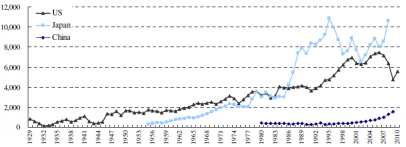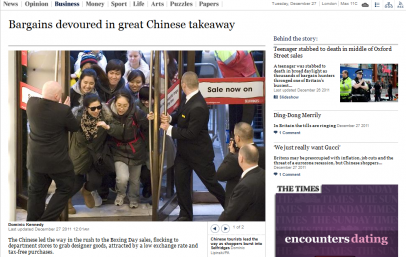China's growth could address imbalance
- By Danny Quah
 0 Comment(s)
0 Comment(s) Print
Print E-mail China.org.cn, January 2, 2012
E-mail China.org.cn, January 2, 2012
Second, as John Ross reminds us, investment too is aggregate demand. But, third, continuing to increase China's investment in, among other things, infrastructure and transportation can help further as it allows those western, poorer regions in China (again Figure 2) better to integrate both nationally and globally, and thus become richer through raising demand and productivity.
While many observers make much of China's high investment to income ratio, it is useful to note that that ratio is high not just because its numerator is being driven up, but also because the denominator remains so low. The right state variable for dynamic analysis in a neoclassical growth model is capital per head, not capital per unit of income. And here (Figure 3):
 |
|
Figure 3: China's per capita investment |
We see how China still has a long way to go on the upside.
Finally, Figure 4:
 |
|
Figure 4: "The Chinese led the way in the rush to the Boxing Day sales, flocking to department stores to grab designer goods", The Times of London, 27 December 2011. |
However much anyone might doubt those China statistics I used above, auxiliary evidence shows that rich Chinese consumers have no difficulty increasing consumption.
The evidence I've described doesn't of course say that global imbalances can be easily erased through just more economic growth in China. However, the algebraic signs of the required relations seem to me to point at least in the right direction. Careful work to quantify these effects might end up showing that their magnitudes aren't large enough. But, as far as I know, that calibration has not been done, which makes me wonder why some observers can be so certain that China's current growth trajectory can only exacerbate global imbalances.
When China becomes rich, that will also dramatically lower inequality in the world — globally, the difference in incomes per head across nations overwhelms that across individuals within a single country. No one I know arguing for a more egalitarian society also says that that push for equality should stop at their nation's borders and be kept from applying seamlessly across humanity's seven billion.
The author is a columnist with China.org.cn. For more information please visit: http://www.keyanhelp.cn/opinion/dannyquah.htm
Opinion articles reflect the views of their authors, not necessarily those of China.org.cn.





